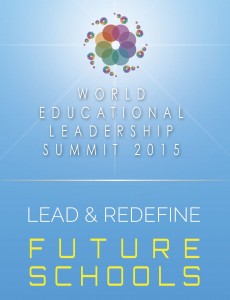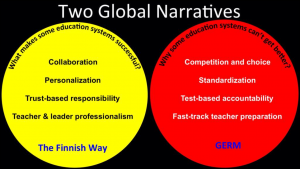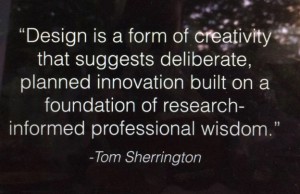I have long wondered how narrow my educational lens is, and if I really have got a grasp of other global perspectives on all matters education. Attending the World Educational Leaders Summit (7th-9th April) in Singapore was just the opportunity I was looking for to network and learn from some of the 1000 strong delegation from 21 countries.
Over the course of the three days, several new connections were made with educators and system leaders from China, South Korea, Vietnam, New Zealand, Malaysia, Singapore, India, Germany, Finland, UK, USA, Turkey, USA to name a few. I feel these connections will prove beneficial in the future to enrich my learning and widen my lens of educational thinking.
Now, I am just about over folk dismissing future thinking and scenario-planning in education out of hand. So, this conference, entitled ‘Leading and Redefining Future Schools’, was for me about whether we want to be ostriches or meerkats, burying our heads in the sand or looking outwards. Whether we like it or not, the world is changing and no amount of rhetoric or protectionism is likely to fully shield us from these effects in whatever trickle-down fashion occurs at some point in the future. So I feel the question should be ‘how can schools respond to the current and predicted pressures exerted from external sources and remain a place where ‘every child can engage in an education worth having?’ This is what I was hoping would be broached through this conference, but what I got was so much more?
No Surprises
I shouldn’t have been surprised by the widespread condemnation by attendees of standardised testing and norm-reference and ranking of students and schools and even teachers (with pay implications in some places). Yong Zhao spoke passionately about the importance of counting what counts (the title of his forthcoming book). He presented a great unpicking of the fool’s gold of league tables and the detrimental impact of valuing what we measure rather than measuring what we value, often driven by political ideology. The importance of identifying and nurturing an individuals uniqueness is, Zhao explains, of a critical nature right now.
Pasi Sahlberg expertly deconstructed the issues surrounding some government’s unhealthy attachment complex with PISA and the direct effect a ‘race to the top mentality’ can have on districts, teachers and students. His ‘Two Global Narratives’ model (GERM – Global Educational Reform Movement V the Finnish Way) was a perfect illustration of how to focus on the right things. , building the profession through trust and collaboration, rather than suffocate it with test-based accountability. He also shared how striving to achieve strong equity and high quality of achievement should be the goal of all systems (and had 1000 delegates singing Stairway to Heaven’ to reinforce the point!).
The Improvement/Innovation Intersection
There was significant agreement amongst delegates that it is positive that schools are engaged in, and with research. However, whilst there was a healthy respect for research literacy and the notion of evidence to inform practice or decisions, very few were prepared to sacrifice their efforts to develop innovative practice in the face of fast-changing and challenging educational conditions. Most are aware that we can, and in some cases, have worked out what works.
Some schools however, struggle from time-to-time to adapt to change and can neglect to leverage their most pressing issues to achieve growth according to Simon Breakspear, choosing instead to embark on fanciful innovations in the hope to improve. He argued that the opportunity to innovate and rapidly prototype solutions to problems can aid transformation, but only at the speed of trust between educators. Breakspear suggested a design thinking approach to our work could be advantageous in making schools more responsive to emerging challenges through research or structural adjustments. He quoted Tom Sherrington below:
Continuing with this message, Tony Wagner made clear to us that ‘isolation is the enemy of improvement and innovation’. Schools who are keen to see students engage deeply in work that matters and develop skills in craftsmenlike fashion which can optimise achievement, see teachers working together in formal and informal settings to make this a reality.
Children at the heart of learning, and leaders leading holistically
Sugata Mitra discussed the role of SOLEs (self-organising learning environments – see here) and the dramatic impact they are having in some schools and systems around the world. He argued strongly that designing places of learning should be predicated on LETTING learning happen rather than MAKING learning happen. The role of technologies to assist the learning process (not overwhelm or replace other forms) was a strong feature. He attested that given the right conditions (trust, initial knowledge, supportive innovation, reliable technology and clear goals), students can start to invent their own pedagogical methods and frameworks.
Finally, Stephen Murgatroyd walked us through the leadership challenges for future schools and outlined some key practices which effective leaders embody who are transforming schools and even districts (citing his research and work in Canada). These included:
- Practicing personal mastery and being the leading learner – develop confidence and practice what you preach.
- Apply a ‘glocal’ (acting local but thinking global) mindset. Appreciate there are other wonderful things occurring in schools and systems beyond our bubbles – capitalise on them.
- Accelerate cross-boundary (and sector) learning. Leverage technology and networks to assist this.
- Think back from the future and be intentional about vision, evidence-based decisions and scenario-building.
- Lead systematic change and communicate every step that is being taken with clarity and consistency.
- Drive performance with passion and unwavering commitment – but let trust be the currency.
My takeaways?
From a memorable three days, a few things have become clear. It was powerful to think much bigger, wider and deeper about significant aspects of education, things which have universal ramifications. These include 4 key takeaways.
Takeaway 1: Leaders, look after yourself as well as your students, teachers and community. Leaders serve others, but you really matter (Stephen Murgatroyd)
Takeaway 2: Teachers, schools, don’t immunise yourself against innovation. Explore what’s best for learning and growth (staff and students) for YOUR context (Tony Wagner and Simon Breakspear) and see Pasi Sahlberg’s recent article here regarding Singapore’s capacity to embrace failure as learning
Takeaway 3: Teachers don’t need surveillance, they need support, encouragement and to feel trusted in order to grow and enjoy their important work (Pasi Sahlberg)
Takeaway 4: Celebrate diversity as a strength and seek every opportunity to foster uniqueness in children (Yong Zhao and Sugata Mitra)
I feel very fortunate to have attended this event and pleased to have been left thinking about what happens next for me, our school and our community. I was also delighted to finally meet Cameron Paterson (Head of Teaching and Learning at Shore School, Sydney), an educator whose work, thinking and writing I deeply admire. Australia is blessed with some excellent teachers, leaders and thinkers, and while I shall endeavour to engage global educators to enrich my view, I am cognisant that there are many here ‘at home’ who offer so much already. I for one shall certainly not be an ostrich.



Great post Jon. Enjoyed reading your reflections from what was clearly a powerful gathering of minds. Isn’t it nice when it all comes together? I particularly liked Stephen Murgatroyd’s key practices and your own takeaways from the event. These gave me food for thought and reflection in my own context. Thanks for enabling this.
Hi Jon,
What an inspiring post. Thank you for sharing your takeaways from this conference – such a great line up of speakers. I really like the meerkat analogy. Sometimes its more comfortable to be an ostrich, but being future focused and outward looking is the best way we can serve our students.
Jon, I really like the ‘think aloud’ coming through strongly in your writing. I can hear your voice clearly especially after our discussion. Your takeaways are particular inspiring because I think you have captured the essence of the messages each presenter was sharing. I also applaud that you have identified that in our own countries we have some amazing educators.